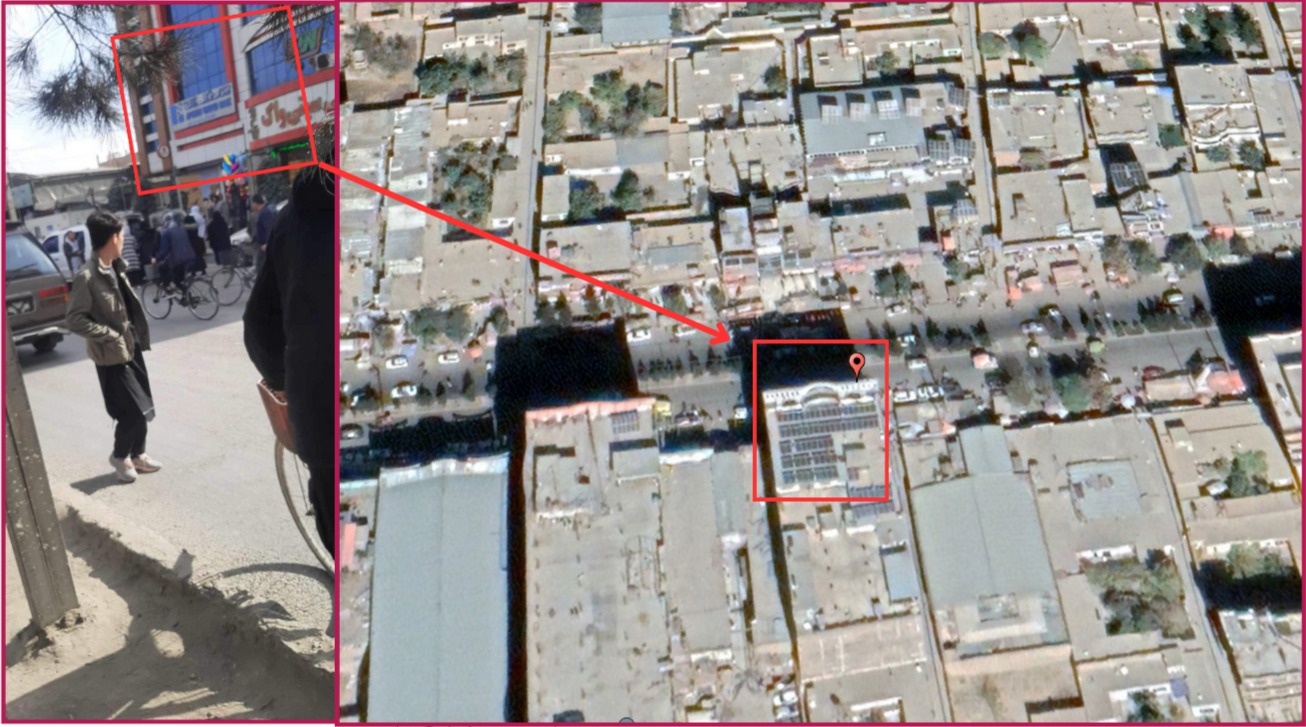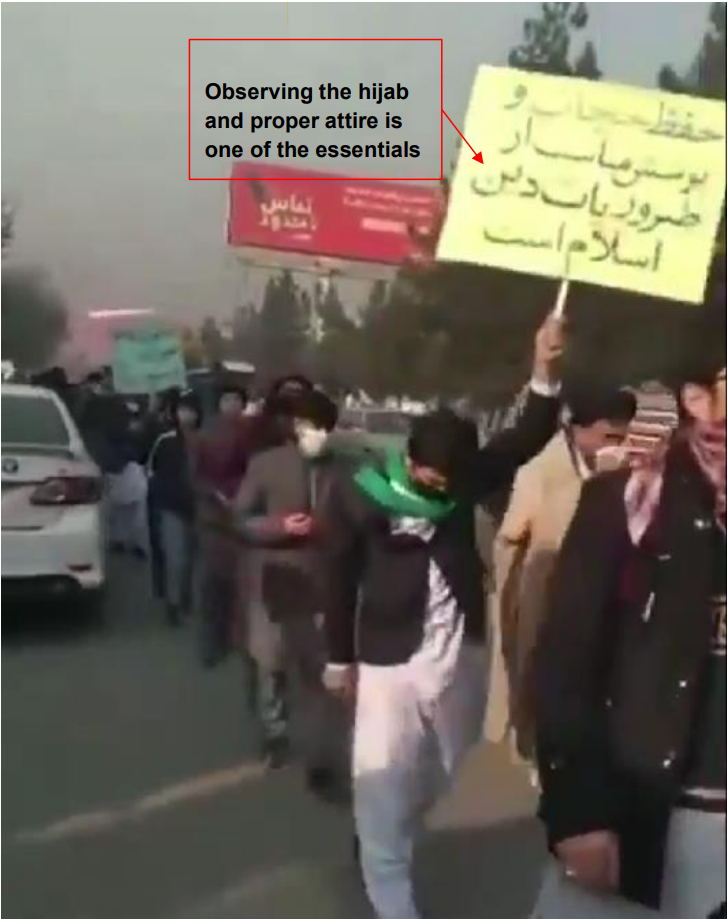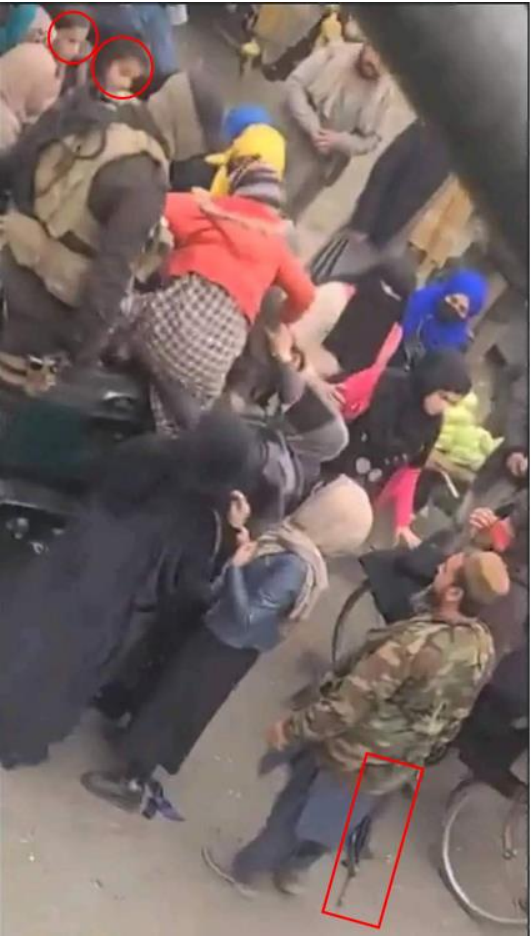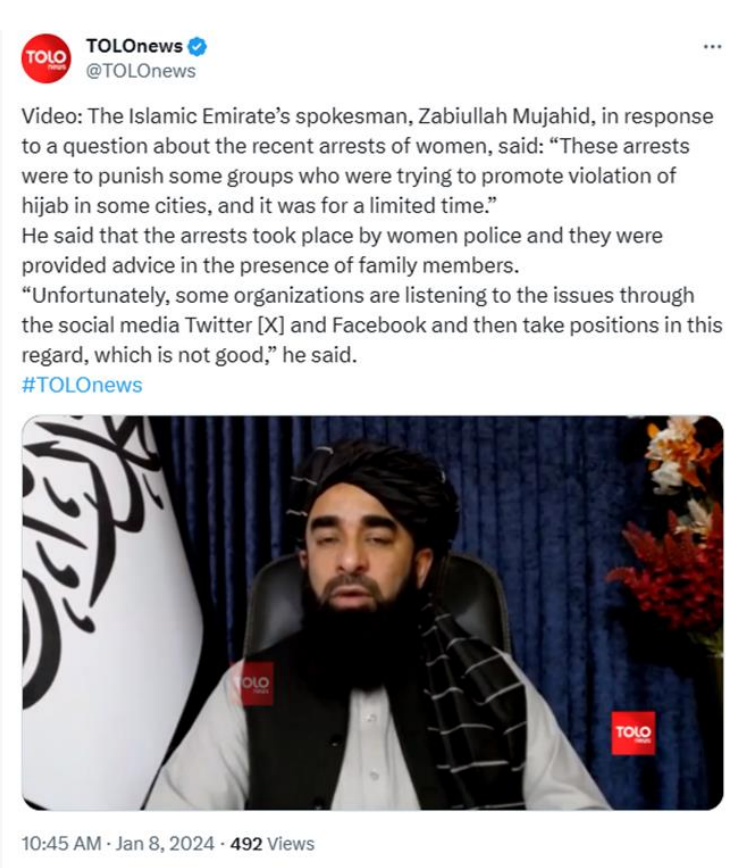Arrests reported for non-compliance with hijab rules in early January
On 1 January 2024, the Taliban’s Ministry for the Propagation of Virtue, and the Prevention of Evil (MPVPE) initiated a campaign arresting women and girls for non-compliance with hijab rules. On the same day, media reports emerged saying the Taliban had arrested women for hijab violations in predominantly Shia areas of Kabul: Dasht-e-Barchi, Pol-e-Khoshk, Tank-e-Tel, and establishments including the Barchi City Centre, Bahar-e-Sarab, and City Walk. The founder of Rukhshana Media, Zahra Joya, stated on X (formerly Twitter) that 18 girls had been detained.
AW was unable to verify the exact number of women who were arrested, as videos purportedly showing the arrests were inconclusive. However, AW geolocated a photograph capturing arrests in Dasht-e-Barchi. The photo features several women near a vehicle; AW determined it was taken in front of the City Walk shopping centre (see below).

Figure: Photo of the alleged arrest of women in front of the City Walk shopping centre in the Dasht-e Barchi area of Kabul [34.499920, 69.070012].
On 3 January 2024, a video was posted on social media showing a group of Dasht-e-Barchi residents marching, holding placards supporting hijab regulations. As this footage gained traction, Afghanistan International reported that the marchers – many of whom were related to the women who were detained – claimed they had been coerced into orchestrating pro-hijab demonstrations by the Taliban. AW has been unable to confirm this claim.

Figure: A screenshot from the video of residents marching in Kabul’s Dasht-e-Barchi area, in support of the hijab.
On 7 January 2024, additional reports claimed that the Taliban had arrested women and girls in Kabul’s northern Taimani and Khair Khana areas, potentially as part of the same campaign.

Figure: A photograph circulated by the media captures the detained women seated in the back of a Taliban Ranger Vehicle. The image suggests the presence of children among those detained.
Taliban officials provide contradictory statements regarding arrests.
Taliban officials issued contradictory statements about the veracity of the arrests: Some MPVPE officials stated that some women had been arrested and referred to judicial officials for further action. On 3 January 2024, MPVPE spokesperson Mawlawi Abdul Ghafar Sabawoon confirmed to BBC Pashto that the ministry had arrested women in Kabul on grounds related to the hijab and attire, citing violations of Islamic values, rituals, and the alleged encouragement of respectable women to reject the hijab. Sabawoon added that the women would be “handed over to judicial authorities or released on bail.”
On 8 January 2024 however, the MPVPE then denied that women arrested in Kabul’s Khair Khana area were apprehended due to their non-compliance with the hijab. Rather, the Ministry claimed the women in question were beggars, and were collected by the Taliban to provide them with a salary, and assistance, after registering their biometric data.
Several Taliban officials instead denied that any women had been arrested for violating hijab rules. For example, in an interview with state-run Radio Afghanistan (RTA) posted on 6 January 2024 Taliban spokesperson Zabiullah Mujahid refuted claims of arresting women for not wearing the hijab, stating that some had been briefly detained and advised against engaging in activities that risk corrupting society, but were then released.
The same day, Tolo News posted a video of Mujahid addressing the womens’ arrests in Kabul, which was later deleted without explanation. In the video, Mujahid claimed that external entities recruited specific women to advocate for the violation of the hijab, who were briefly detained by female police, taken to police stations, and, in the presence of their family members, provided advice on the importance of adhering to the hijab before being released, but none were subjected to imprisonment during this process. Separately, on 8 January 2024, Mujahid confirmed the arrests of women to CBS News, saying:
“A group of women who were involved in modelling to promote clothes were detained, advised in front of their family members, and released within hours. No woman was subject to imprisonment during this process.”

Figure: Screenshot of the Tolo News’ interview with the Taliban Spokesman Zabiullah Mujahid about the women’s arrest in Kabul, now deleted.
On 10 January 2024, the MPVPE issued statements noting that ministry officials held public meetings in Kandahar and Farah as part of an initiative to promote the observance of hijab among women. In the days that followed the detentions, Afghan authorities issued conflicting statements about the arrests, which AW interpreted as an indication that central authorities were not prepared to communicate about the event. It is not possible, however, to say whether this was due to a lack of foresight, surprise at the attention the detentions received, or a lack of awareness regarding plans of the MPVPE’s crackdown.
The Taliban’s engagement with the Shia community
Following the arrest campaign, which focused on the largely Shia Dasht-e-Barchi area of Kabul, the Taliban aimed to respond to community concerns in the area to dispel accusations of bias against Shias.
On 4 January 2024, the MPVPE issued a statement regarding the Minister’s meeting with Shia scholars in Kabul to address “certain ongoing minor issues,” related to the recent arrests of women and girls in Dasht-e-Barchi. The statement claimed that the scholars expressed their support for the Taliban, and emphasised the crucial role of the MPVPE.
Taliban officials also convened a meeting at the Imam Zaman Shia Mosque in Dasht-e-Barchi on 9 January 2024, to clarify the circumstances surrounding the arrests. There, the Taliban’s Chief of Police stated that police women only arrested women and girls who were wearing improper clothing for the purpose of informing their families, and prevent the same behaviours in the future. The police chief further stressed that they do not request individuals to adhere strictly to the “authentic Sharia hijab”, which permits “only one eye to be visible for the purpose of vision”.
Notably, AW observed that in the video documentation of the arrests, all of the women and girls appeared to be wearing head coverings.
A Shia representative at the 9 January gathering urged the Taliban to engage in dialogue with Shia representatives, or the families of the affected girls, rather than resorting to arrests. This sentiment was echoed by Dasht-e-Barchi residents in interviews the following day by Afghan YouTuber Sumia Samimi. Both men and women (including Hazara and Shia women), expressed their support for the Taliban’s hijab requirements, and some suggested the Taliban should provide clearer guidelines to ensure that all women can comply with regulations. Samimi also noted that following the Taliban’s crackdown, there had been a noticeable increase in the number of women wearing hijabs in the area.
Local concern and condemnation of the arrests
Despite Taliban engagement of the Shia community, concern was expressed by local figures. Prominent Hazara leader Haji Mohammad Mohaqiq said that the “arrest and disrespect” of women and girls in Kabul, under the guise of enforcing the hijab, was a selective excuse for the “ethnic and religious humiliation” of Hazaras. He added that it was another example of the Taliban’s human rights violations.
Some Taliban officials even took issue with the arrests. On 7 January 2024, Shafi Azam, the Taliban’s Director of Economic Relations at the Ministry of Foreign Affairs, implicitly criticised the arrests in a social media post where he referred to them as “harmful behaviours” against the nations cultural values, referencing the general sensitivity regarding the arrest of women and girls in Afghanistan.
International reaction to arrests
Numerous women’s rights activists have condemned the arrests in the media. Munisa Omarzada, for example, described the Taliban’s actions as politically motivated, rather than solely related to the hijab. She urged the UN and the international community to heed the pleas of Afghan women and intervene in the unfolding crisis. Tamana Zaryab Paryani, a women’s rights activist, who is currently residing in Germany, pledged to persist in raising her voice for Afghan women until the world breaks its “shameful silence.”
Fawzia Koofi, former deputy speaker of the Afghan parliament and prominent women’s rights activist, currently living in the UK, criticised the global shift of attention from Afghanistan to Gaza. She claimed the Taliban exploited this diversion to escalate their campaign against women, and called on the international community to hold the Taliban accountable. Richard Bennett, the UN Special Rapporteur on Afghanistan also expressed concern over the Taliban’s arrests of women for “bad hijab’” and called for the womens’ immediate and unconditional release.
Reaction to arrests from anti-Taliban opposition groups and individuals
On 5 January 2024, in response to the arrests of women in Kabul, the founder and leader of the Afghanistan National Resistance Front (NRF) Ahmad Massoud said on X (formerly Twitter) that the Taliban was accelerating its own demise by “kidnapping” and disrespecting women. He claimed that the Taliban’s actions were fuelling resistance among those fighting for Afghanistan’s dignity and freedom.
Then, on 11 January 2024, the Afghanistan Freedom Front (AFF), an anti-Taliban armed resistance group, claimed responsibility for an explosion in the northern outskirts of Kabul, alleging they had targeted a convoy of Taliban vehicles that were apprehending women as part of the recent arrest campaign. AW observed that the video released by the AFF alongside this claim merely displays smoke along the roadside, captured from a considerable distance.
The National Resistance Council for the Salvation of Afghanistan also denounced the arrests, saying they were a blatant violation of Afghanistan’s cultural norms, Islamic principles, and international human rights. In an official statement, issued on 10 January 2024, the Council urged the UN and global community to document these human rights violations.
Many others also condemned the Taliban’s arrests of women and girls over the issue of the hijab, including former minister of foreign affairs Hanif Atmar, former director of intelligence Rahmatullah Nabil, and the Tajik-dominated Jamiat-e-Islami party.


